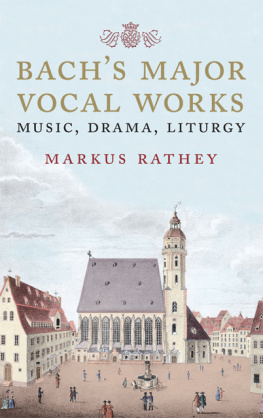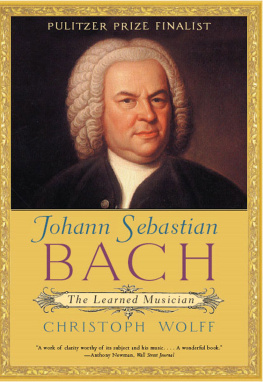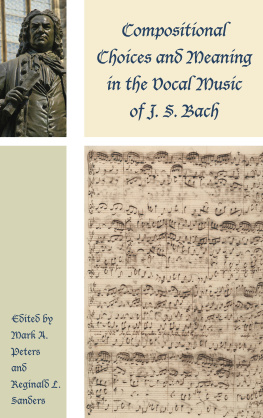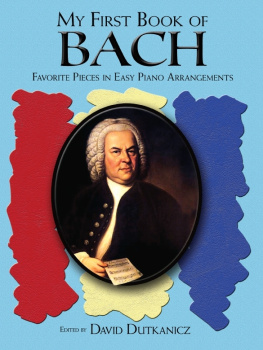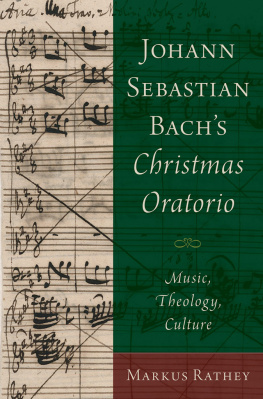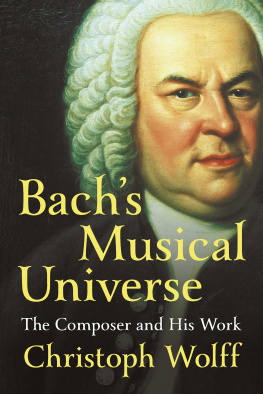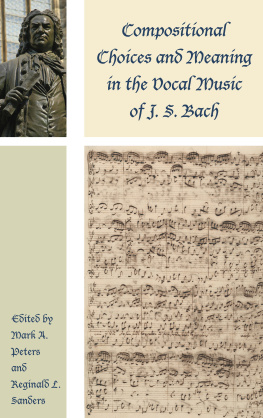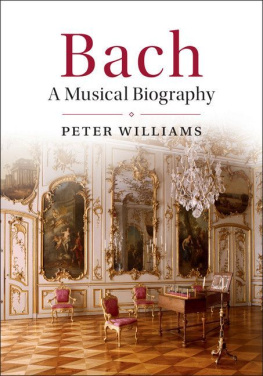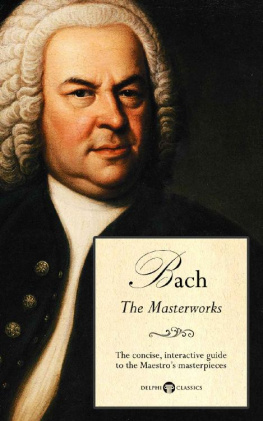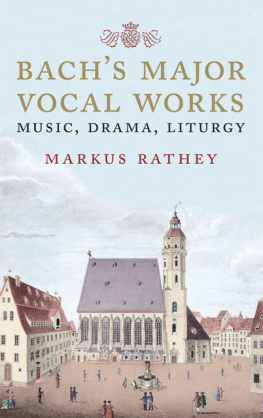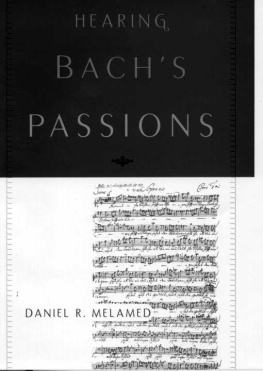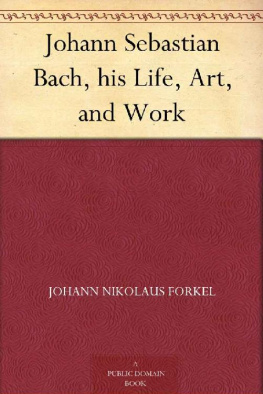

Copyright 2016 Markus Rathey
All rights reserved. This book may not be reproduced in whole or in part, in any form (beyond that copying permitted by Sections 107 and 108 of the U.S. Copyright Law and except by reviewers for the public press) without written permission from the publishers.
For information about this and other Yale University Press publications, please contact:
U.S. office:
Europe Office:
Typeset in Adobe Caslon Pro by IDSUK (DataConnection) Ltd
Printed in Great Britain by Gomer Press Ltd, Llandysul, Ceredigion, Wales
Library of Congress Cataloging-in-Publication Data
Rathey, Markus, author.
Johann Sebastian Bach : the major vocal works / Markus Rathey.
pages cm
Includes bibliographical references and index.
ISBN 978-0-300-21720-9 (alk. paper)
1. Bach, Johann Sebastian, 1685-1750. Vocal music. I. Title.
ML410.B13R29 2016
782.22092dc23
2015035258
A catalogue record for this book is available from the British Library.
10 9 8 7 6 5 4 3 2 1
To my students and colleagues at the
Yale Institute of Sacred Music
I submit in deepest devotion the present small work
of that science which I have achieved in musique.
J. S. Bach, 1733
Nil canitur suavius, nil auditur jucundius.
Hymn Jesu dulcis memoria
CONTENTS
ACKNOWLEDGEMENTS
This book has grown over more than a decade. During the past twelve years at the Yale Institute of Sacred Music I had the opportunity to teach courses on Johann Sebastian Bachs vocal music, to coach conductors and singers how to perform these pieces, and to give public lectures on Bachs oratorios, passions and his B Minor Mass. Collaborating with conductors such as Masaaki Suzuki, Helmuth Rilling, David Hill, Marguerite Brooks, and Simon Carrington has given me invaluable insights into the music.
Most of the chapters in this book have started as pre-concert lectures for performances at Yale and other places, such as the Bach Festival at Baldwin Wallace University (Berea, OH). Writing program notes for numerous ensembles and performances has encouraged me to write texts that are also accessible to non-musicians. Three ensembles I have collaborated with for several years now and which have inspired me with their performances are the Yale Schola Cantorum (since 2003), the Yale Camerata (since 2004), and the Chicago Bach Project (since 2011). I should also mention the Bach Collegium Japan. Not only has Masaaki Suzuki been a wonderful colleague for several years but his recordings of Bachs music have also accompanied my work on most of the chapters.
I am grateful to colleagues and friends who have read parts or all of the manuscript and who have given me valuable comments and suggestions: Kathryn Aaron, Danielle Annett, Stephen Crist, Mark Peters, James Taylor, and Thomas Troeger. My research assistant, Emilie Coakley, has edited the manuscript meticulously. I am also grateful to the anonymous readers for Yale University Press, whose constructive remarks have helped make the argument in this book even stronger. Robert Baldock, Rachael Lonsdale, and Candida Brazil at Yale University Press have supported me in this project and have overseen a smooth and efficient production process.
I am indebted to my students and colleagues at the Yale Institute of Sacred Music for their scholarship and support, the inspiration of their music-making, their passion for the visual and literary arts, and the countless conversations, both in class and outside the classroom. This book is dedicated to them.
Markus Rathey
New Haven, October 2015
A NOTE ON TRANSLATIONS
The translations of the texts for Bachs oratorios are based on Michael Marissen, Bachs Oratorios. The Parallel German-English Texts with Annotations (Oxford: Oxford University Press, 2008). Translations of texts from Bachs cantatas follow Alfred Drr, The Cantatas of J. S. Bach, trans. Richard D. P. Jones (Oxford: Oxford University Press, 2005). All other translations (especially of theological texts from the seventeenth and eighteenth centuries) are mine unless stated otherwise.
CHAPTER ONE
PRELUDE
Towards the beginning of the second decade of the nineteenth century, the London-based New Monthly Magazine and Literary Journal published a rather odd description of Johann Sebastian Bachs oratorios:
Bach, too, is said to have written Oratorios of the highest merit; but, in this particular, we are under the necessity of taking the word of his biographer [Johann Nikolaus Forkel]. We are not acquainted with them; indeed they are little known, and probably were planned on a limited scale. But we can fully imagine what he might have produced in this department, by referring to some sacred compositions that have come under our notice. A solemn, pious simplicity, is their distinguishing feature; they abound with melodies of the most select and elevated cast; the accompaniments are of the first order; and the choruses, although on a more limited scale than Handels, are equally grand and impressive.
We smile about this anonymous authors attempt to imagine what Johann Sebastian Bachs oratorios might have sounded or looked like. The article comes with a preconceived notion of the composer that is based on his works for keyboard and the few vocal works (especially the motets) that had come to light. It is 1821 and we are still eight years away from Felix Mendelssohn Bartholdys performance of the St Matthew Passion in 1829, which will mark the return of Bachs music to the public sphere. Bach and his music had never been entirely forgotten. However, his only music that was widely known and available at the time was his keyboard works, which were studied by composers and pianists alike. We cannot blame this British author for trying to accomplish an impossible task: to extrapolate the character of Bachs oratorios based on works such as the Well-tempered Clavier or his motets. A few of his assumptions are even spot-on, like the most select and elevated melodies and the grand and impressive choruses. At other times the author is misled by preconceived notions. Works like the St Matthew Passion or the Christmas Oratorio were clearly not planned on a limited scale. Neither are most of Bachs choruses on a more limited scale than Handels.
But the mention of Handel in this context points to one of the problems this author had to deal with. The English notion of baroque music was dominated by the works of George Frideric Handel (16851759). His oratorios were a national musical treasure and works by other composers like Bach had to be described and understood in relation to the standards set by Handel. Very soon, music historiography established a view of Bach and Handel as polar oppositesHandel as the international and extroverted composer and Bach as the German and introverted cantor and keyboardist. Another quotation from our article reflects this view:
Obvious misconceptions like Bachs almost infantine simplicity or the lack of works for full orchestra are again due to the authors limited knowledge (based on the works accessible in 1821) of Bachs music. However, the view of Bachs character and music that is expressed here explains why the author was led to assume that Bachs oratorios had to be on a much smaller scale than Handels.
Todays listeners know more about Bach and his vocal works, but we still come with certain preconceived notions and expectations. They might be more informed than the article from 1821, but we nevertheless have an image of Bach that we want to see confirmed in the oratorios, passions, and cantatas we hear in concerts and other performances. The anonymous authors article poses the intriguing question: what characterizes Bachs major vocal works? Why did Bach compose them? What was the original function of his oratorios, passions, the masses, and the
Next page
